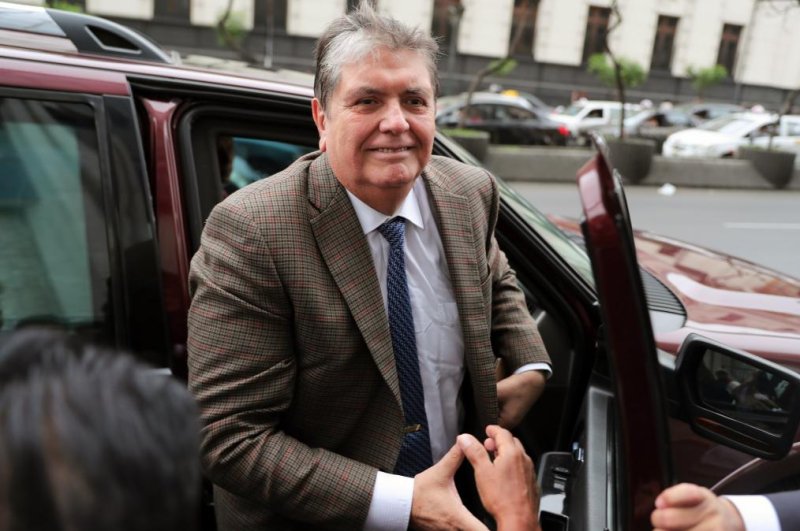The government of Uruguay said Monday it denied a request for political asylum by former Peruvian President Alan Garcia. File Photo by Ernesto Arias/EPA
Dec. 3 (UPI) -- Uruguay President Tabare Vazquez said Monday his government decided it won't grant political asylum to former Peruvian President Alan Garcia, who's accused of taking bribes.
Investigations in Uruguay have concluded Garcia's case is not one of "political persecution," Vazquez told reporters, El Pais Uruguayan newspaper reported. He said Garcia has already left Uruguay's Embassy in Lima, where he took refuge on Nov. 17.
"In Peru there is an autonomous and free function of the three powers of the State, specially the Judicial power," he added.
Garcia, who faced an order from a judge that sought to prevent him from fleeing prosecution by leaving Peru, requested asylum when he arrived at the Lima embassy. He's facing corruption charges related to bribery by Brazilian construction company Odebrecht.
Peruvian newspaper El Comercio quoted an official from the Peruvian foreign ministry in reporting Garcia likely left the embassy Monday. Peruvian press said he likely left in a vehicle with tinted windows that was seen leaving earlier.
Garcia is accused of taking bribes from Odebrecht in the form of lucrative fees for presentations in conferences.
A court ordered last month Garcia could not leave Peru for 18 months and must face the charges. The order was issued after prosecutors said there was a high chance of flight.
Garcia ruled the Andean country from 1985 to 1990, a period marked by hyperinflation, economic mismanagement, guerrilla fighting and sharp contractions in the country's production and revenue capacity.
In the early 1990s, he received asylum in Colombia and lived in Paris for several years in a luxury residence. Charges of corruption then expired due to a statute of limitations. In 2006, he was elected to a second term of five years after defeating candidate Ollanta Humala, who at that time raised concerns due to what many perceived as proximity to former Venezuelan President Hugo Chavez.
Garcia has purchased expensive real estate In recent years and justified the income on a series of conferences he gave abroad as former president. However, investigations have revealed that in at least one instance, a payment of $100,000 was provided indirectly by Odebrecht from a slush fund.
Odebrecht, one of the largest infrastructure companies in the region, has been in the center of a corruption scandal that's affected several Latin American countries.
Former Odebrecht CEO Marcelo Odebrecht has cooperated with authorities and admitted to schemes in which company officials bribed top authorities in Brazil and other countries in exchange for high profile infrastructure projects, which came with inflated price tags.
Marcelo Odebrecht was sentenced in 2016 for having paid $30 million in bribes to secure business for his company.
Presidents and former presidents, as well as high-ranking officials, in most Latin American countries have faced investigations related to the case.
In the most prominent case related to Odebrecht, Brazilian former President Luiz Inacio Lula da Silva was jailed earlier this year. He created the Worker's Party that ran Brazil for 13 years and included two consecutive terms by Lula da Silva. Most of the testimony against Lula came from Odebrecht.
Investigators said Odebrecht channeled slush funds to presidents and other high ranking authorities through means like campaign contributions, as well as payments for conferences once the leaders were out of government.
Former Peruvian President Ollanta Humala and wife Nadine Heredia were freed from jail in May after several months of prison, while they face Odebrecht corruption related charges for illegal campaign contributions.
Peruvian opposition leader Keiko Fujimori, who had narrowly lost the two most recent presidential elections and her party was the most powerful force in Congress for several years. She was jailed in October and could be there for as many as 36 months on similar charges.
Pedro Pablo Kuczynski, elected as president of Peru in 2016 for a five-year term, resigned in March as an impeachment related to corruption looked imminent. Reports have said companies he owned have been linked to potential Odebrecht bribing that would've occurred in the early 2000s, when he was a economy minister of former President Alejandro Toledo.
Toledo, who governed Peru between 2001 and 2006, lives in the United States, even as Peruvian authorities have issued an international order arrest and put him on a most wanted list in connection also to corruption. He and close relatives have made real estate purchases that cannot be justified, Peruvian authorities have said.















